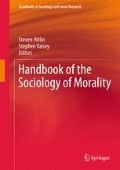Abstract
This chapter modifies Randall Collins’ interaction ritual chains theory in order to identify how individuals distinguish between what is sacred (off limits to competitive market rules) and what is profane. The empirical examples come from international trade shows in Thailand, home décor and handicraft markets in Thailand and Costa Rica as well as from small factories and artisans’ workshops. Interaction rituals enable individuals to embody moral codes and to revivify distinctions between the sacred and the profane. Individuals are not fully cognizant of the moral standards they have embodied, but these standards accomplished anew with each interaction and begin to crystallize when there is a focused interaction where most distractions are submerged. While each market situation regenerates normative principles, the concatenation of these normative principles throughout a chain of interactions gives rise to trans-situational values. Although, Durkheim theorized the clear separation of the sacred from the profane and thought about the machinations of the market as profane, Durkheim’s analysis of religious ritual can usefully be applied to such nonreligious realms as the marketplace. By taking a Durkheimian approach, one can identify various ritual ingredients that regenerate moral distinctions in the marketplace, and one can ask how the disabling or the removal of those ingredients might alter the regeneration of these distinctions.
Access this chapter
Tax calculation will be finalised at checkout
Purchases are for personal use only
References
Abolafia, M. Y. 1996. Making Markets: Opportunism and Restraint on Wall Street. Cambridge, MA: Harvard University Press.
Anuman Rajadhon, P. 1988. Essays on Thai folklore. Bangkok: Thai Inter-Religious Commission for Development and Santhirakoses Nagapradipa Foundation.
Bourdieu, P. 1990. The Logic of Practice. Cambridge: Polity Press.
Bourdieu, P. 2005. The Social Structures of the Economy. Malden, MA: Polity.
Collins, R. 2004. Interaction Ritual Chains. Princeton, NJ: Princeton University Press.
DiMaggio, P. 1990. “Cultural Aspects of Economic Action and Organization.” PP. 113–136 in Beyond the Marketplace: Rethinking Economy and Society, edited by R. Friedland, and A. F. Robertson. New York: Aldine de Gruyter.
Durkheim, E. 1995 (1912). The Elementary Forms of Religious Life. Translated by K. E. Fields. New York: The Free Press.
Fligstein, N., and L. Dauter. 2007. “The Sociology of Markets.” Annual Review of Sociology 33:105–128.
Fourcade, M., and K. Healy. 2007. “Moral Views of Market Society.” Annual Review of Sociology 33:385–311.
Goffman, E. 1959. The Presentation of Self in Everyday Life. Garden City, NY: Doubleday.
Goffman, E. 1961. Encounters: Two Studies in the Sociology of Interaction. Indianapolis, IN: Bobbs-Merrill.
Goffman, E. 1967. Interaction Ritual. New York: Vintage.
Granovetter, M. 2002. “A Theoretical Agenda for Economic Sociology.” PP. 35–60 in The New Economic Sociology: Developments in an Emerging Field, edited by M. F. Guillén, R. Collins, P. England, and M. Meyer. New York: Russell Sage Foundation.
Guillén, M. F., R. Collins, P. England, and M. Meyer. 2002. “The Revival of Economic Sociology.” PP. 1–32 in The New Economic Sociology: Developments in an Emerging Field, edited by M. F. Guillén, R. Collins, P. England, and M. Meyer. New York: Russell Sage Foundation.
Hitlin, S., and J. A. Piliavin. 2004. “Current Research, Methods, and Theory of Values.” Annual Review of Sociology 30:359–393.
Kopytoff, I. 1986. “The cultural Biography of Things: Commoditization as Process.” PP. 64–91 in The Social Life of Things: Commodities in Cultural Perspective, edited by A. Appadurai. Cambridge: Cambridge University Press.
Portes, A. 1995. “Economic Sociology and the Sociology of Immigration: A Conceptual Overview.” PP. 1–41 in The Economic Sociology of Immigration: Essays on Networks, Ethnicity, and Entrepreneurship, edited by A. Portes. New York: The Russell Sage Foundation.
Rokeach, M. 1973. The Nature of Human Values. New York: The Free Press.
Schwartz, B. 1993. “On the Creation and Destruction of Value.” in The Origin of Value, edited by L. N. M. Hechter, and R. E. Michod. New York: De Gruyter.
Schwartz, S. H., and W. Bilsky. 1987. “Toward a Universal Psychological Structure of Human Values.” Journal of Personality and SOcial Psychology 53:550–562.
Simmel, G. 1955. Conflict: The Web of Group-Affiliations. Glencoe, IL: Free Press.
Stets, J. E. 2006. “Identity Theory and Emotions.” PP. 203–223 in Jonathan H. Turner, edited by J. E. Stets. New York: Springer.
Stryker, S. 2004. “Integrating Emotion Into Identity Theory.” Advances in Group Processes 21:1–23.
Summers-Effler, E. 2006. “Ritual Theory.” PP. 135–154 in The Handbook of the Sociology of Emotions, edited by J. E. Stets, and J. H. Turner. New York: Springer.
Swedberg, R. 2003. The Principles of Economic Sociology. Princeton: Princeton University Press.
Vaisey, S. 2009. “Motivation and Justification: A Dual-Process Model of Culture in Action.” American Journal of Sociology 114:1675–1715.
Wherry, F. F. 2008. Global Markets and Local Crafts: Thailand and Costa Rica Compared. Baltimore: Johns Hopkins University Press.
White, H. C. 1981. “Where Do Markets Come From?” American Journal of Sociology 87:517–547.
Zelizer, V. 1985. Pricing the Priceless Child: The Changing Social Value of Children. New York: Basic Books.
Zelizer, V. A. 2005. The Purchase of Intimacy. Princeton: Princeton University Press.
Author information
Authors and Affiliations
Corresponding author
Editor information
Editors and Affiliations
Rights and permissions
Copyright information
© 2010 Springer Science+Business Media, LLC
About this chapter
Cite this chapter
Wherry, F.F. (2010). The Sacred and the Profane in the Marketplace. In: Hitlin, S., Vaisey, S. (eds) Handbook of the Sociology of Morality. Handbooks of Sociology and Social Research. Springer, New York, NY. https://doi.org/10.1007/978-1-4419-6896-8_8
Download citation
DOI: https://doi.org/10.1007/978-1-4419-6896-8_8
Published:
Publisher Name: Springer, New York, NY
Print ISBN: 978-1-4419-6894-4
Online ISBN: 978-1-4419-6896-8
eBook Packages: Humanities, Social Sciences and LawPhilosophy and Religion (R0)

